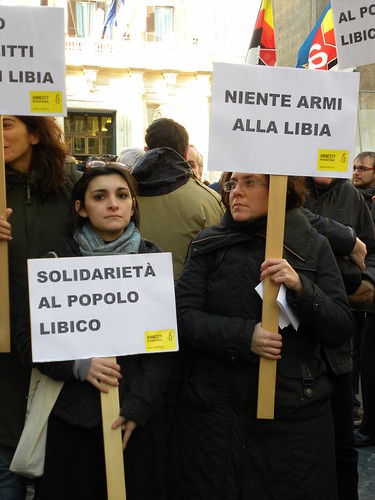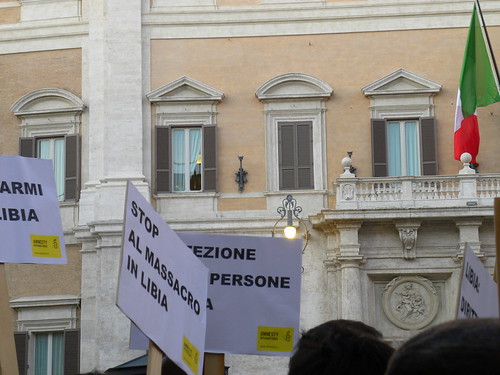Predictably, the big worry interventionist in Libya is likely to result in a stalemate. There are those who accuse the cowardice of the West, but there is probably something below. And that is the unwillingness to support the rebels, despite the peculiar characteristics of the situation in Libya, were placed on the same wavelength of Tunisian and Egyptian revolutionaries.
It is no coincidence that, in this very hour, Hamas in Gaza is repressing the Palestinian students applying for national unity among the various factions, while in Bahrain, Saudi troops firing on demonstrators in the total silence of the Arab world and the international community. We are the epilogue of the Arab revolution? Hard to say ...
but one can hope that the long wave unleashed by the Tunisian riots go on and on. In fact, the basic needs in terms of democracy, fundamental rights, dignity and work, there are still quite unhappy, even in Europe, especially Mediterranean on his side. Libya, however, remains in many ways a special case.
Gaddafi has been able to raise the banner of national independence against the interference of foreign powers. The insurgents have probably done so adventurous, underestimating the strengths and resources of the system, which went on the offensive. He confirmed, however, an inability to act at international level quickly and effectively.
It would be interesting to ascertain the extent to which the sanctions were implemented by Resolution 1970, in particular those concerning the freezing of assets (asset freeze), for example in Italy, where property belonging to the family Gaddafi are many and substantial. It is however poorly calibrated measures for emergency situations where you need to act in a timely manner.
What to do at this point? Should certainly avoid the bloodshed. The Security Council should impose a ceasefire and send troops interposition. Once obtained the blocking of the fighting, it could launch a national negotiation. Obviously if we had moved from the beginning on this line, as suggested by Chavez and Lula, instead of playing around on unrealistic assumptions of armed intervention or illusion in an improbable military victory of the rebels, you could probably get some results today.
But the great powers look first to its own interests. This is particularly true for the EU Member States, as the time of Yugoslavia and then Iraq has confirmed the total inconsistency of its foreign policy. The only intervention was prepared by France, which has evidently in a hurry to replace Ben Ali, at any cost and to reaffirm its role in the region.
To all revolutionaries, important lessons: first, to be on your own, avoiding unnecessary illusions. The people you liberate themselves, relying on non-interventionism in the words of this or that. 


It is no coincidence that, in this very hour, Hamas in Gaza is repressing the Palestinian students applying for national unity among the various factions, while in Bahrain, Saudi troops firing on demonstrators in the total silence of the Arab world and the international community. We are the epilogue of the Arab revolution? Hard to say ...
but one can hope that the long wave unleashed by the Tunisian riots go on and on. In fact, the basic needs in terms of democracy, fundamental rights, dignity and work, there are still quite unhappy, even in Europe, especially Mediterranean on his side. Libya, however, remains in many ways a special case.
Gaddafi has been able to raise the banner of national independence against the interference of foreign powers. The insurgents have probably done so adventurous, underestimating the strengths and resources of the system, which went on the offensive. He confirmed, however, an inability to act at international level quickly and effectively.
It would be interesting to ascertain the extent to which the sanctions were implemented by Resolution 1970, in particular those concerning the freezing of assets (asset freeze), for example in Italy, where property belonging to the family Gaddafi are many and substantial. It is however poorly calibrated measures for emergency situations where you need to act in a timely manner.
What to do at this point? Should certainly avoid the bloodshed. The Security Council should impose a ceasefire and send troops interposition. Once obtained the blocking of the fighting, it could launch a national negotiation. Obviously if we had moved from the beginning on this line, as suggested by Chavez and Lula, instead of playing around on unrealistic assumptions of armed intervention or illusion in an improbable military victory of the rebels, you could probably get some results today.
But the great powers look first to its own interests. This is particularly true for the EU Member States, as the time of Yugoslavia and then Iraq has confirmed the total inconsistency of its foreign policy. The only intervention was prepared by France, which has evidently in a hurry to replace Ben Ali, at any cost and to reaffirm its role in the region.
To all revolutionaries, important lessons: first, to be on your own, avoiding unnecessary illusions. The people you liberate themselves, relying on non-interventionism in the words of this or that.



No comments:
Post a Comment